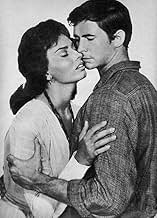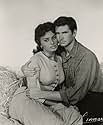ÉVALUATION IMDb
6,5/10
1,5 k
MA NOTE
Quand le père d'Eben se remarie et annonce qu'il lui lèguera la ferme, cela déclenche les passions qui se transforment en nuit de désir et de rage entre Eben et sa belle-mère.Quand le père d'Eben se remarie et annonce qu'il lui lèguera la ferme, cela déclenche les passions qui se transforment en nuit de désir et de rage entre Eben et sa belle-mère.Quand le père d'Eben se remarie et annonce qu'il lui lèguera la ferme, cela déclenche les passions qui se transforment en nuit de désir et de rage entre Eben et sa belle-mère.
- Nommé pour 1 oscar
- 3 nominations au total
Rebecca Welles
- Lucinda Cabot
- (as Rebecca Wells)
Edna Bennett
- Housewife Gossip
- (uncredited)
Florine Carlan
- Young Girl
- (uncredited)
Robert Cass
- Seth
- (uncredited)
- …
Vera Denham
- Farm Woman
- (uncredited)
Harvey B. Dunn
- Farmer
- (uncredited)
Dick Elliott
- Old Farmer
- (uncredited)
Jamie Forster
- Farmer
- (uncredited)
Greta Granstedt
- Men
- (uncredited)
Sandra Harrison
- Young Girl
- (uncredited)
Avis en vedette
This movie was made primarily as a star vehicle and things like the artistic integrity of the plot were thought of as unimportant. Needless to say, the movie suffered noticeably.
I saw this movie originally as part of a course on plays made into movies. Though this wasn't the most badly manhandled of the plays that we studied, it is a close second to "Sexual Perversity in Chicago" which became "About Last Night" staring Rob Lowe and Demi Moore.
Don't get me wrong, it's not a bad movie, but it could have been great.
As much as I hate to say it, this is one of the rare cases where a remake might be in order. It is possible to imagine that a director willing to make a more faithful rendition could easily create something better than the original.
I saw this movie originally as part of a course on plays made into movies. Though this wasn't the most badly manhandled of the plays that we studied, it is a close second to "Sexual Perversity in Chicago" which became "About Last Night" staring Rob Lowe and Demi Moore.
Don't get me wrong, it's not a bad movie, but it could have been great.
As much as I hate to say it, this is one of the rare cases where a remake might be in order. It is possible to imagine that a director willing to make a more faithful rendition could easily create something better than the original.
Anthony Perkins and Sophia Loren are absolutely gorgeous in this ca. 1840 "Western". That alone, however doesn't help a ridiculous story, with countless historically incorrect elements.
Byrl Ives is convincing as the 70-something tyrannical patriarch, an egomaniac who swears to see his 100th birthday. His wild dancing at a party he gives for his neighbors will make anyone take notice (this guy is SEVETY SIX?). Always mumbling Bible verses, he demands respect, while driving sons and friends away with his self-righteous rantings and emotional cruelties.
The love affair between Perkins and Loren at first appears absurd, but becomes believable near the end. There is plenty of drama, but not enough to feel good about. Clearly written for the stage, this story was dated even when it was filmed. Perkins whistles "My Bonnie" in the 1840s, although the song wasn't composed until 1882.
Critics knocking Sophia Lorens "command of the English language" are rather petty. I found her English flawless and completely audible. As a Neapolitan, Loren speaks a distinct dialect that often had to be dubbed into "proper Italian". Her "accent", however, hardly affects how she speaks English. As a first Generation German American, I can appreciate the efforts of those who learn English as a second, or even third or fourth language.
"Desire Under The Elms" is a drama (or even a tragedy) in the Classic Sense. For my enjoyment is was missing a logical story and an overall "pay off" for the time invested. Fans of the stars won't want to miss it, others, however, tune in at your own risk!
Byrl Ives is convincing as the 70-something tyrannical patriarch, an egomaniac who swears to see his 100th birthday. His wild dancing at a party he gives for his neighbors will make anyone take notice (this guy is SEVETY SIX?). Always mumbling Bible verses, he demands respect, while driving sons and friends away with his self-righteous rantings and emotional cruelties.
The love affair between Perkins and Loren at first appears absurd, but becomes believable near the end. There is plenty of drama, but not enough to feel good about. Clearly written for the stage, this story was dated even when it was filmed. Perkins whistles "My Bonnie" in the 1840s, although the song wasn't composed until 1882.
Critics knocking Sophia Lorens "command of the English language" are rather petty. I found her English flawless and completely audible. As a Neapolitan, Loren speaks a distinct dialect that often had to be dubbed into "proper Italian". Her "accent", however, hardly affects how she speaks English. As a first Generation German American, I can appreciate the efforts of those who learn English as a second, or even third or fourth language.
"Desire Under The Elms" is a drama (or even a tragedy) in the Classic Sense. For my enjoyment is was missing a logical story and an overall "pay off" for the time invested. Fans of the stars won't want to miss it, others, however, tune in at your own risk!
Desire Under the Elms is one of those films that is a lethal combination: sordid and sluggish. It's not as though it would have been much better or less offensive if it went at a faster clip, but the funereal pacing only makes you recognize how hopeless it all is. The three leads try (and Burl Ives in particular gets well into the part), but at this point, the tale of a forbidden love affair and its consequences, once a much praised play by Eugene O'Neill, feels more like one of those horribly overheated and vulgar true crime stories that feature on TV as you race to move on to another channel. What can you really say when you can't stand any of the parties in this love (or is it lust) triangle? As Audrey Hepburn might have said in Breakfast at Tiffany's, they are all "superrats". What little there is that is salvageable to some degree is the remarkably crisp black-and-white cinematography and yet another fine musical score by Elmer Bernstein. Otherwise, a complete wash.
If you imagine yourself in a 1950s New York theatre surrounded by American anti-Communists wearing narrow ties and wanting to be cultured, you'll be able to connect with this wooden, would-be Greek tragedy. If not, don't go there, and get on board with TV's the Cartwrights, who seem to inhabit identical territory and period because they were performing almost simultaneously for an audience thousands of times bigger. It's worth watching for Antony Perkins, who is superbly mixed-up as an anti-authoritarian rebel determined to secure ownership of the family farm, but driven a bit strange by anxiety, paternal neglect and the early death of his mother. See him exit his lover's garden gate, pirouetting as he goes; or spinning in place before rising from his bed. It's so graceful you barely notice. He's like an 11 year-old, changing his mind every five minutes, madly self-conflicted as a result of his irresistible lust for the maid, sorry, his father's third wife. Sophia Loren is powerful in this picture, if you can follow her English. She really occupies her part and fills her space. The passion between her and Perkins would be almost believable, if it weren't expounded in this stagey setting, with neither Loren nor Perkins exposing any skin, which just adds to the sense of attending a school play. Actually, the basic material of Desire Under The Elms is purely adult, but somehow this production renders it about as sinful as Agatha Christie.
After a couple of studio films shot on location, Italian actress and sex symbol Sophia Loren finally made it onto Hollywood soil for this uneven, uncertain melodrama adapted from Eugene O'Neill's controversial play. A tyrannical New England farmer (Burl Ives), who apparently worked his past two wives to death, brings home a new wife to meet his sons--two of whom take off for California and the third (Anthony Perkins) who stays and eventually falls in love with the Mrs. The performers seem to be at a mismatch with this very strange material; though they try hard, the heavy prose and illogical situations would be enough to defeat anybody. The character motivations aren't always clear, not helped by the narrative which, at a crucial point, jumps ahead in time and nearly alienates the audience. Ives gives a full-throttle, blustery-old-windbag performance which infuses the scenario with a prickly tension (and the screenplay surprisingly never scores points against him), but glinty-eyed Loren is a bit out of her depth. Still, she survives the absurd final reel with her dignity intact, while the picture ends on such a dour note that the overall impression is one of supreme dissatisfaction. Daniel L. Fapp won an Oscar nomination for his handsome (if overlit) photography; Delbert Mann directed in an awkward and stagy fashion. **1/2 from ****
Le saviez-vous
- AnecdotesThe original 1924 Broadway production made Walter Huston a Broadway star; he was 40 years old, playing a septuagenarian. He was later in several more Eugene O'Neill plays.
- GaffesIn several outdoor scenes, people cast two (or more) shadows showing that there are two light sources.
- ConnexionsFeatured in Biography: Sophia Loren: Actress Italian Style (1997)
Meilleurs choix
Connectez-vous pour évaluer et surveiller les recommandations personnalisées
- How long is Desire Under the Elms?Propulsé par Alexa
Détails
- Date de sortie
- Pays d’origine
- Langue
- Aussi connu sous le nom de
- Desire Under the Elms
- Lieux de tournage
- société de production
- Consultez plus de crédits d'entreprise sur IMDbPro
- Durée1 heure 51 minutes
- Couleur
- Rapport de forme
- 1.85 : 1
Contribuer à cette page
Suggérer une modification ou ajouter du contenu manquant

Lacune principale
By what name was Désir sous les ormes (1958) officially released in Canada in English?
Répondre































